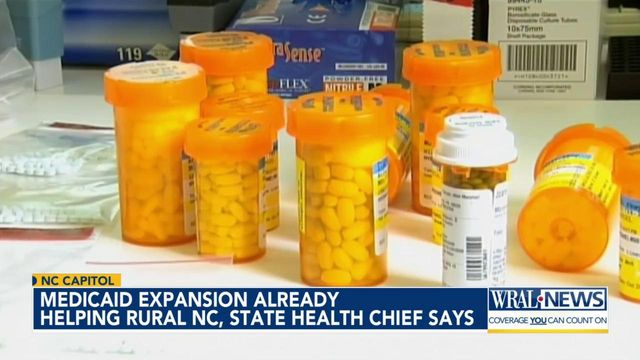NC Medicaid expansion already helping rural areas, state health chief says
Medicaid expansion has only been in place for seven weeks in North Carolina. But data shows it's already helping more than 300,000 people, many in rural parts of the state. State DHHS Secretary Kody Kinsley sat down with WRAL News to talk about the program's progress.
Posted — UpdatedThe state health department this week unveiled a new dashboard that shows expansion progress by county. It shows that at least 314,000 people are now covered by Medicaid. About 273,000 were already in the system but ineligible until Dec. 1. Another 41,000 were added to the system in the past few weeks.
“I've known of no other state that's been able to get as many people enrolled as quickly as we have been able to,” Kody Kinsley, the secretary of the state Department of Health and Human Services, said in an interview with WRAL News.
The counties where expansion is making the biggest difference so far are some of the poorest in the state. In Robeson County, 11.9% of the adult population – 8,114 people – were added to the Medicaid rolls under expansion. In Edgecombe County, it’s 10.9%, and Richmond County added 9.6%. Out west, Swain County added 9.3% of its adult population to the program.
“Disproportionately, the majority of the folks that are getting covered are in rural communities across the state,” Kinsley said. “These are folks that have languished for a long time in the state with the second largest rural population, and Medicaid expansion is making a difference for that.”
Not only are people getting covered, they’re already getting care.
Asked about the biggest challenges to the expansion process, Kinsley cited reimbursement rates, workforce and public awareness.
The state’s reimbursement rates for dental and primary care don’t cover the actual cost to providers, he said, which disincentivizes providers from covering Medicaid patients. He said that’s an issue he plans to work on with lawmakers in the upcoming legislative session.
The adequacy of the healthcare workforce, especially in rural areas, is also a concern. While he hasn’t yet heard reports of provider shortages, Kinsley said, that could happen in the future.
“Over a million people haven't had a way to pay for something,” he said. “If you don't have a way to pay for your care, then you don't have the providers there to be able to do it. So we're in a period where the economy is going to have to rebalance out, now that so many more people have a way to pay.”
Kinsley said he’s particularly concerned about recruiting and retaining direct care workers who provide home care or take care of the elderly or disabled in facilities. Medicaid expansion is likely to increase demand for them.
“That's a workforce that's critical,” Kinsley said. “And it's a workforce that has been able to make more money working over at Bojangles than being able to go into people's homes.”
The last hurdle, Kinsley says, is public education about Medicaid expansion. He says a lot of newly eligible people may not even know it.
“I think about that mom or dad who are working multiple jobs to take care of their kids, and maybe take care of their parents because they're in the sandwich generation,” Kinsley said. “They're managing a lot of complexities. Maybe their car's broken down. The last thing they have time to do is really to pay attention to Medicaid expansion. So we're going to have to keep getting the word out over and over and over again.”
Kinsley said DHHS is planning an ad campaign to increase awareness, and will continue working with faith leaders and other community groups to spread the word. He also said hospitals are now screening intakes for eligibility and helping people apply for coverage. Eligibility screening will also soon be added to other government services as well, he said.
• Credits
Copyright 2024 by Capitol Broadcasting Company. All rights reserved. This material may not be published, broadcast, rewritten or redistributed.






